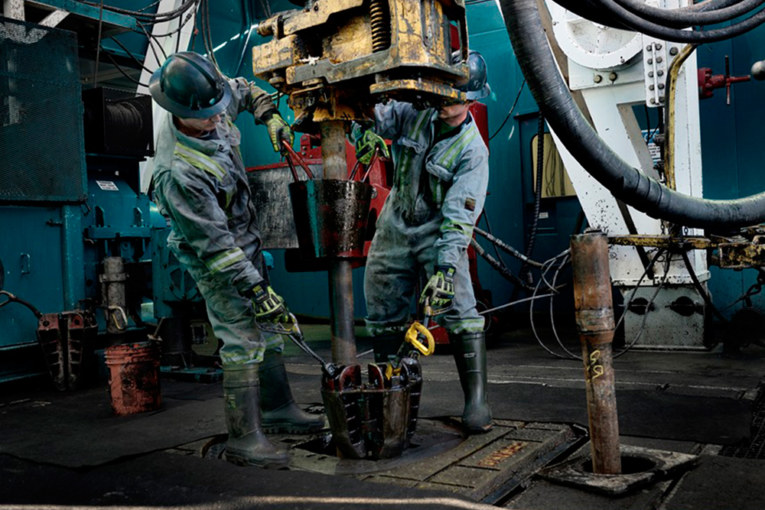
CALGARY – Encana Corp.’s name change and relocation isn’t likely to radically improve its performance on its own, even if it does attract more passive U.S. investment funds, financial analysts and fund managers say.
Encana president and CEO Doug Suttles said on an earnings call Thursday that plans to move the iconic company’s headquarters from Calgary to the U.S. were motivated in part by its underperformance to its U.S.-based peers.
“We intend to establish a U.S. domiciled company that will expose us to significantly larger and growing pools of investment,” Suttles said during the earnings call. “By looking at prior data, this will expose our company to almost three times the amount of index participation we see today as a Canadian company.”
But shares of Encana, which — subject to shareholder approval — will be renamed Ovintiv Inc. when it moves its headquarters from Calgary to a U.S. location, have also underperformed Canadian peers, compelling many analysts to warn that the company’s relocation will not necessarily improve its performance.
“This is not the fix you are looking for,” Raymond James analyst Chris Cox wrote in a research note Friday, adding, “companies that are successfully executing strategically and conveying a compelling message to the Street typically don’t go through a rebranding effort.”
Encana shares fell 6 per cent Thursday after the relocation and rebranding effort was announced, but were trading up 0.7 per cent to $5.20 per share Friday. Cox said he didn’t believe the sell-off was overdone.
“We believe the reaction reflects an investor base that is fatigued and frustrated that this (relocation) is garnering the attention of management, as opposed to more impactful solutions to reverse the disappointing share price performance since the company announced the merger with Newfield,” Cox wrote.
CIBC World Markets analyst Jon Morrison said in a note that he is “perplexed as to the path Encana is taking” because he doesn’t believe “the fact that Encana has been a Canadian-headquartered entity has led to any material share price underperformance.”
Encana senior vice-president, investor relations and communications Steve Campbell told the Financial Post that the move would allow Encana to be listed on the S&P 400 index, prompting a large number of passive funds to buy stakes in the company.
“Our number one job is to make a good return for the owner,” Campbell said, reiterating that Encana was looking to address the underperformance relative to U.S. players.
Encana stock is down 33.38 per cent year to date, compared to S&P/TSX Capped Energy Index’s nearly 11 per cent drop during the period.
Companies that are successfully executing strategically and conveying a compelling message to the Street typically don’t go through a rebranding effort
Chris Cox, analyst, Raymond James
Indeed, many analysts and fund managers were highly critical of the Newfield deal, as it signalled a change in focus for the company away from what used to be called its “core four” resource plays in Alberta and Texas.
“They didn’t appreciate the level of hatred for that play,” Ninepoint Partners senior portfolio manager and partner Eric Nuttall said of the deal, calling it “their worst move.”
The deal brought Encana into a resource play called the Scoop/Stack in Oklahoma, also called the Anadarko basin, which had been a challenging formation for other oil and gas operators to drill.
“No active energy investor wanted them to be in that play,” Nuttall said.
In its third quarter earnings call Thursday, the company said it was producing 162,000 barrels of oil equivalent per day from the formation, which is up 13 per cent from a year ago.
Nuttall also criticized the company for what he called a lack of alignment between shareholders and management. For example, he said CEO Doug Suttles is the second highest paid executive in Calgary but owns only 200,000 shares.
Financial Post Magazine’s CEO 100 Scorecard list on executive compensation among the country’s best performing companies published in October shows the average CEO on the list made $5.50 million annually on average over the past two years. In contrast, Suttles compensation for 2018 was around $12 million, according to Bloomberg.
Latest data from Bloomberg also shows Suttles owns 200,212 shares in Encana. When the company released its management information circular in March, it showed Suttles owned 188,793 shares. The circular does not list a minimum share ownership requirement of Suttles.
“We always want our management to be aligned with the shareholders,” Encana’s Campbell said.
Asked whether or not management would be buying more shares to further align with shareholders, Campbell said the company wouldn’t comment on plans to buy shares but added that Encana offered “compelling value.”
Analysts also criticized a handful of the company’s other acquisitions, including a major deal struck as oil prices were tumbling.
“What put Encana on their knees was that huge deal in 2014,” Canoe Financial senior portfolio manager and director Rafi Tahmazian said, referring to the company’s pivot towards a focus on oil by buying Athlon Energy for $7.1 billion in Sept. 2014.
The deal was struck just as global oil prices were collapsing from above US$100 per barrel to the US$30 per barrel range. Since that time, global oil prices have struggled to rise above US$65 per barrel.
Still, Tahmazian said the company also pulled off a number of better transactions, including the spin out of PrairieSky Royalty and its move to focus on the core four plays.
The company sold off numerous non-core assets following that disposition and had been reducing its debt.
“There are no catalysts on the horizon for the rest of the year, in our view, to cause the stock to outperform, as the company remains in ‘prove itself’ mode on oil growth,” Eight Capital Phil Skolnick wrote in a note.
Financial Post
• Email: [email protected] | Twitter: geoffreymorgan
You can read more of the news on source
